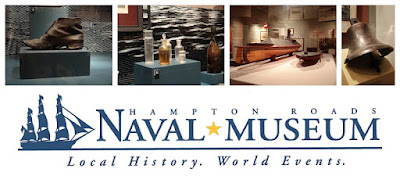Atlantic Fleet battleships steaming from Hampton Roads towards the
"Southern Drill Grounds" in the Chesapeake Bay, 1913 |
We have previously posted about Maryland poultry farmers accusing the Navy of killing over 70,000 chickens during live fire exercise off Tangier Island in 1911. The farmers claimed that the big battleship guns caused such a concussion shock on shore that the poor chickens keeled over and died. The Navy denied having anything to do with the alleged chicken massacre. Two years later, the Navy was back with more ships and bigger guns.
 |
| The Atlantic Fleet at the Southern Drill Grounds as seen from the cage mast of USS Kansas (BB-21) |
The operation was one of the largest Naval exercises to date. Navy planners plotted out a series of static target gun shoots and war games between ships in an area they designated as the "Southern Drill Grounds" in the Chesapeake Bay. Planners preferred the Chesapeake Bay due to the fact that it provided favorable weather conditions. They wanted the water to be somewhat rough to give gunners the chance to practice in choppy water, but not so rough as to cancel the exercise.
 |
| USS Kansas unloads her 12-inch guns at a stationary target |
 |
| 12-inch shell explosions during live fire drills |
The fleet conducted several rounds of live fire shoots with their main guns in late March and early April. The torpedo boat divisions practiced torpedo attack runs on the battleships during the middle of the night. Several senior naval officers served as observers and kept score of hits and misses of the stationary targets and determined the success of the torpedo boats against the battleships. Witnessed by several U.S. Senators and Secretary of the Josephus Daniels, the exercises were by all accounts a success.
 |
| With their round of shooting done, officers on board Kansas observe other battleships' firings. |
That is not how local Marylanders saw it. Like the 1911 operation, Maryland civilians who lived near Tangier Island claimed the battleship gun shoots were having a devastating affect on their town and their agribusiness. One newspaper reported that buildings in Chrisfield, Maryland had their shattered windows and cracked foundations. The newspaper even claimed some of their chimneys were knocked off. In addition, Chrisfield watermen claimed the concussion waves killed thousands of fish. They were also afraid of getting hit by stray shells. Local poultry farmers claimed that eggs cracked and were hatching prematurely. The Navy had no comment on these allegations.



No comments:
Post a Comment